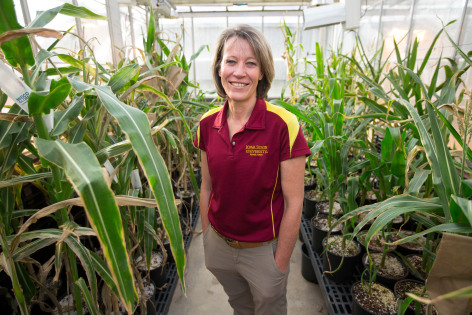AMES, Iowa – A multi-state experiment that recently received a major grant will examine how planting cover crops on farm fields affects plant disease, pests and weeds.
Alison Robertson, a professor of plant pathology and microbiology at Iowa State University, will lead a portion of the experiments as part of a much larger project awarded a $10 million grant from the U.S. Department of Agriculture’s Agriculture and Food Research Initiative. The overall project includes around 100 scientists at 35 institutions and will seek to develop new tools to improve sustainability, profitability and efficiency in agriculture by enhancing the effectiveness of cover crop-conservation tillage systems for commodity crops such as corn, soybeans and cotton.
Robertson will lead experiments that will be replicated in 15 states from Florida to Iowa to gauge how the termination of rye cover crops affects the susceptibility of corn and soybean to disease, pests and weeds. Robertson’s previous research suggested planting corn too quickly after terminating the cover crop can increase the risk the corn seedlings will contract disease. Her research indicated waiting two weeks after the termination of the rye to plant corn reduces the likelihood of disease, but those findings were tested only in a single environment.
Robertson said the newly funded research station experiments test the timing of rye termination in a wide range of temperatures and soil types.
“It’s really exciting because we found these results in Iowa, but we don’t know what’s happening in the rest of the country,” she said. “Do farmers need to worry about this in Florida or Texas, Kentucky or Ohio, for instance? We’re going to try to answer that question.”
Farmers sometimes grow cover crops, such as legumes and grasses, on their fields to protect soil and water quality, but cover crops typically are not harvested for cash income.
The experiments led by Robertson will include plots in which the rye cover crop is terminated at various points in time before planting, as well as after corn has already been planted. The results could be of interest to farmers who have experienced delays in planting due to weather. In those instances, farmers may choose to use the limited time they have to get in their fields to plant their crops and wait until later to terminate the cover crop.
The overall project seeks to develop a suite of tools – including online and cloud-based platforms, on-farm monitoring systems, decision-support apps and data management techniques – that can help farmers make more informed management decisions tailored to the specific conditions of their operations. The results from the experiments Robertson is coordinating will optimize these tools. The effort, led by Chris Reberg-Horton of North Carolina State University and Steven Mirsky of the USDA’s Agriculture Research Service, taps a wide range of disciplines including crop management, systems modeling and social sciences.
